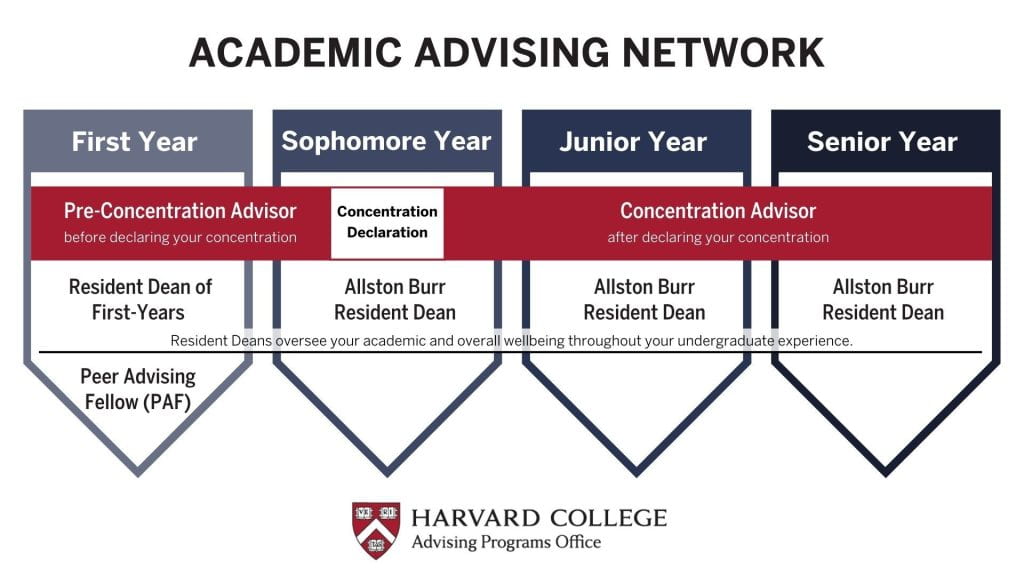Throughout your four years, you will have many academic advisors who form a network to ensure that you can explore your academic interests, get support when you need it, and reflect on how your experiences inform your curricular and co-curricular decisions.

First Year
Before you arrive on campus, you will be assigned a Pre-Concentration Advisor who serves as your primary resource for academic advising until you declare your concentration. You will also join a residential entryway community, in which you will have the personal support of an assigned proctor and the oversight of your Resident Dean of First-Years. You will also have a Peer Advising Fellow (PAF), an upper-level student who can help you navigate the transition to college and the academic and co-curricular opportunities available to you.
Sophomore Year
In your sophomore year, you will join a residential House community in which you will receive supplemental support from an Allston Burr Resident Dean as well as residential and non-residential tutors. Some specialized tutors include pre-med tutors, pre-law tutors, fellowship tutors, and more. These in-House resources will support you before and after you declare your concentration. You will continue to receive primary academic advising from your Pre-Concentration Advisor until you declare your concentration.
Upon Concentration Declaration
After you declare a concentration, you will be assigned a concentration advisor (usually a faculty member, Director of Undergraduate Studies, Assistant Director of Undergraduate Studies, or Undergraduate Program Coordinator) who will advise you on field-specific courses, research, and career planning. You will work with your concentration advisor until graduation.
Advising Relationship Expectations
Advising relationships are important ones that are built around trust, mutual understanding, and initiative on the part of both the advisor and the advisee. Each advisor provides unique perspectives and experiences to help inform advisee pathways and future goal setting. The expectations listed below are specific to the academic advising role at Harvard but are not exhaustive of other non-academic advising roles that many of these individuals also take on.
Expectations of Advisors:
- Provide informed individual support
- Know about the curriculum, academic policies, and resources
- Be accessible, responsive, and proactive
- Foster reflections
Expectations of Advisees:
- Prepare for advising meetings
- Be proactive
- Keep an open mind
- Be responsive, punctual, and respectful
Special Student Populations
First-Generation, Low-Income Students
The Office of Culture and Community and several other organizations provide support and connections to resources for first-generation low-income students. In addition, your Yard, House, or Community has Proctors or Tutors who support first-generation low-income students and focus on issues of diversity, inclusion, and belonging. Here are a few additional resources to explore:
International Students
The Harvard International Office provides immigration advising and services for international students who are in the U.S. in F-1 and J-1 immigration status. The HIO issues immigration documents, provides travel signatures for international travel, and assists international students in applying for U.S. employment authorization, as well as providing advising about remaining in the U.S. for graduate study and/or employment after graduation. International students should contact the Harvard International Office with any questions regarding their U.S. immigration status.
Transfer Students
Amanda Lobell, Resident Dean of Currier House, serves as the Director of Transfer Advising across the College. Dean Lobell is available to assist students on their transition to Harvard and serves as a resource for them once here, especially on anything related to transferring/having transferred.
Veteran Students
US military veterans with supplementary advising needs or any other needs are encouraged to contact Dr. Craig Rodgers, Program Manager for Military Student Services at Harvard College: https://dso.college.harvard.edu/military-affiliates